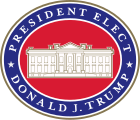Presidential transition of Donald Trump

Top: President Barack Obama (right) and President-elect Donald Trump (left) meet in the Oval Office; Bottom Left: Michelle Obama and Melania Trump have tea in the Yellow Oval Room; Bottom Right: the presidential dais is constructed at the U.S. Capitol for Donald Trump's inauguration
|
|
 |
|
| Predecessor | Donald J. Trump for President |
|---|---|
| Formation | May 9, 2016 |
| Extinction | January 20, 2017 |
| Legal status | 501(c)(4) |
| Purpose | Presidential transition |
| Headquarters | 1717 Pennsylvania Avenue, Washington, D.C., United States |
|
Chairman
|
Mike Pence |
|
Director of Appointments
|
William F. Hagerty |
|
Key people
|
Donald Trump |
| Website | greatagain |
Planning for the presidential transition of Donald Trump, led by then Vice President-elect, former Governor Mike Pence of Indiana, began before Donald Trump won the United States presidential election on November 8, 2016, and became the President-elect. The transition was formerly led by Chris Christie until he and a number of his supporters were replaced or demoted on November 11.
He was formally elected by the Electoral College on December 19, 2016, with 304 electoral votes, 34 more than needed. The results were certified by a joint session of Congress on January 6, 2017, and the transition ended when he was inaugurated at noon EST on January 20, 2017.
In accordance with the Pre-Election Presidential Transition Act of 2010, candidate transition teams are provided office space by the General Services Administration (GSA). Transition teams are also eligible for government funding for staff; spending on Mitt Romney's transition team in 2012 was $8.9 million, all funds appropriated by the U.S. government.
Under existing federal law and custom, the Republican Party's nominee became eligible to receive classified national security briefings once his/her nomination was formalized at the party's national convention.
Key responsibilities of a presidential transition include the identification and vetting of candidates for approximately 4,000 non-civil service positions in the U.S. government whose service is at the pleasure of the president; arranging the occupancy of executive residences including the White House, One Observatory Circle, and Camp David; liaising with the United States Strategic Command for receipt of the Gold Codes; and briefing senior civil service personnel about a new administration's policy priorities.
...
Wikipedia
